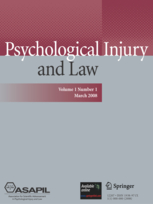M-FAST Not Valid for PTSD Assessment
Recent M-FAST Research
The M-FAST research cited below indicates to me that the test should not be used during C&P PTSD exams with veterans.α,ß
Citation

Wolf, Erika J., Stephanie Ellickson-Larew, Rachel E. Guetta, Shaline Escarfulleri, Karen Ryabchenko, and Mark W. Miller. "Psychometric Performance of the Miller Forensic Assessment of Symptoms Test (M-FAST) in Veteran PTSD Assessment." Psychological Injury and Law, epub ahead of print (15 April 2020). doi:10.1007/s12207-020-09373-y
Commentary

This study by Wolf, et al. (2020), published in Psychological Injury and Law, utilized sophisticated research methodology to comprehensively assess the psychometric properties of the Miller Forensic Assessment of Symptoms Test (M-FAST) with United States military veterans.
The results of the Wolf, et al. (2020) study, leads me to conclude that:
► The M-FAST should not be used to screen for—or to assess—significant exaggeration or feigning during C&P exams for PTSD or other mental disorders.α,ß
► The MMPI-2-RF not only exhibits the very good classification accuracy rates for identifying dissimulation (both minimization and exaggeration/feigning), it also provides important information regarding a veteran's cognitive style and perceptions (THD scale).
► C&P psychologists should administer the MMPI-2-RF or the PAI for almost all Initial and Review C&P exams.
Key Points
* Individuals prone to odd and unusual cognitive symptoms (as reflected in the MMPI-2-RF THD scale) may be more likely to misunderstand some M-FAST items or otherwise respond to them in an idiosyncratic fashion.
* In a previous study MMPI-2-RF THD scores—which suggest odd and unusual cognitive styles and perceptions—were associated with the dissociative subtype of PTSD.
* Thirty-one percent (31%) of the probable PTSD veterans had MMPI-2-RF Fp-r T-scores at or above 100 (13% of the non-PTSD sample exhibited Fp-r ≥ 100).
* Although it was not the focus of this study, the statistics generated about the SIMS are revealing. Specifically, a SIMS cutoff score of 16 classified 74% of the probable (genuine) PTSD sample as positive for (possible) exaggeration/feigning (and 37% of the non-PTSD veterans).
I therefore believe the best SIMS screening cutoff score is at least >19π and as high as >23,Γ because the SIM Manual's recommended cutoff score of 14 and the alternative cutoff score of 16, both exhibit unacceptably high false positive rates.
Abstract
This study examined the psychometric properties of a widely used measure of symptom exaggeration, the Miller Forensic Assessment of Symptoms Test (M-FAST, Miller, 2001), in a sample of 209 (83.7% male) trauma-exposed veterans (57.9% probable current posttraumatic stress disorder; PTSD).
M-FAST total scores evidenced acceptable internal consistency, but several subscales showed poor internal consistency.
Factor analytic and item-response theory analyses identified seven poorly performing items.
Comparisons with other measures of psychopathology and response validity (including subscales from the Minnesota Multiphasic Personality Inventory-2 Restructured Form) revealed that M-FAST scores were highly correlated with indices of psychopathology while less strongly associated with measures of symptom over-reporting.
Empirically and clinically-derived (using a follow-up testing-the-limits procedure) revised M-FAST scores failed to improve the measure’s psychometric performance.
Results raise concerns about the validity of the M-FAST for identifying malingering in veterans with PTSD and carry implications for access to care and forensic evaluations in this population.
(Paragraph breaks, bold text, and emphasis added to facilitate online reading.)
Footnotes
α. This is my opinion based on this article's findings and on previous M-FAST research.
ß. Although this research examined M-FAST performance and PTSD, the study's results reveal psychometric weaknesses that would likely affect M-FAST reliability and validity with other mental disorders as well. I can explain further if desired—submit a question or comment below (near the bottom of this web page).
Γ. Wisdom, Nick M., Jennifer L. Callahan, and Terry G. Shaw. "Diagnostic Utility of the Structured Inventory of Malingered Symptomatology to Detect Malingering in a Forensic Sample." Archives of Clinical Neuropsychology 25, no. 2 (2010): 118-125. (In an archival, known-groups study of psychological injury claimants and plaintiffs, a SIMS cut score of >23 had sensitivity of 0.55 and specificity of 1.00.)
π. Clegg, C., Fremouw, W., & Mogge, N. (2009). Utility of the Structured Inventory of Malingered Symptomatology (SIMS) and the Assessment of Depression Inventory (ADI) in Screening for Malingering Among Outpatients Seeking to Claim Disability. The Journal of Forensic Psychiatry & Psychology, 20(2), 239-254. (In a combination simulation (community sample) and known-groups (Social Security disability claimants) design, a SIMS cutoff score of >19 had sensitivity .90 and specificity .69; a cut score of >20 had sensitivity of .85 and specificity of .71).
PTSDexams.net is an educational site with no advertising and no affiliate links. Dr. Worthen conducts Independent Psychological Exams (IPE) with veterans, but that information is on his professional practice website.
Subscribe to receive new articles and other updates
What Do You Think?
I value your feedback!
If you would like to comment, ask questions, or offer suggestions about this page, please feel free to do so. Of course, keep it clean and courteous.
You can leave an anonymous comment if you wish—just type a pseudonym in the "Name" field.
If you want to receive an email when someone replies to your comment, click the Google Sign-in icon on the lower right of the comment box to use Google Sign-in. (Your email remains private.)
↓ Please comment below! ↓


